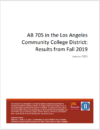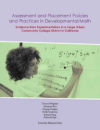Equity for Community College Students | Research Team | Publications | Projects | News
Pullias Reports

AB 705 in the Los Angeles Community College District: Results from Fall 2019
Melguizo, T., Ching, C. D., Ngo, F., & Harrington, D.
Pullias Center for Higher Education (2021)
This report describes early outcomes of AB705 implementation in the Los Angeles Community College District (LACCD), one of the largest community college districts in the country. Using data on first-time-in-college (FTIC) students from Fall 2017, Fall 2018, and Fall 2019, the report describes differences in math and English course enrollments, course passing rates, and one-term throughput (i.e.,the number of completions of math and English transfer-level courses for each entering cohort) before and afterAB705 implementation.
Categories: College Access, STEM Reform, Student Success, Math Equity
Download 1.01 MB 4921 Downloads

Assessment and Placement Policies and Practices in Developmental Math: Evidence from Experimentation in a Large Urban Community College District in California
Tatiana Melguizo and Pullias team (2015)
This report examines assessment and placement policies used to assign students to developmental education in California and summarizes findings from seven studies related to key decisions throughout the process. We discover how colleges place students impacts persistence and transfer, that there are various ways to improve placement policies, and that students will benefit from additional support to bolster their math confidence when they enter college. To conclude, we outline steps that policymakers and practitioners can take to improve the process.
Categories: STEM Reform, Math Equity, Policymaking
Download 841.95 KB 18755 Downloads
Academic Papers
Melguizo, T., Flores, S.M., Velasquez, D., & Carrol, T. (Forthcoming/2021). Lost in the transition: The cost of college-readiness standards misalignment in English for Previously Classified English Learners, The Journal of Higher Education.
Ngo, F., Velasquez, D., & Melguizo, T. (online first/2021). Faculty perspectives on using high school data in an era of placement testing reform, Community College Journal.
Ngo, F., & Melguizo, T. (2020). The equity cost of inter-sector math misalignment: Racial and gender disparities in community college outcomes. The Journal of Higher Education. https://doi.org/10.1080/00221546.2020.1811570
Park, E.S., Ngo, F., & Melguizo, T. (2020). The role of misaligned math in the community college STEM pathway. Research in Higher Education. https://doi.org/10.1007/s11162-020-09602-y
Ngo, F., Chi, W. E., & Park, E. S.Y. (2018). Mathematics course placement using holistic measures: Possibilities for community college students. Teachers College Record, 120(2). https://eric.ed.gov/?id=EJ1162841
Ngo, F., & Kosiewicz, H. (2017). How extending time in developmental math impacts student persistence and success: Evidence from a regression discontinuity in community colleges. The Review of Higher Education, 40(2), 267-306. https://doi.org/10.1353/rhe.2017.0004
Fong, K. E., & Melguizo, T. (2017). Utilizing additional measures of high school academic preparation to support students in their math self-assessment. Community College Journal of Research and Practice, 41(9), 1-27. https://doi.org/10.1080/10668926.2016.1179604
Ngo, F., & Melguizo, T. (2016). How can placement policy improve math remediation outcomes? Evidence from experimentation in community colleges. Educational Evaluation and Policy Analysis, 38(1), 171-196. https://doi.org/10.3102/0162373715603504
Melguizo, T., Bos, J., Ngo, F., Mills, N., & Prather, G. (2016). Using a regression discontinuity design to estimate the impact of placement decisions in developmental math. Research in Higher Education, 57(2), 123-151. https://doi.org/10.1007/s11162-015-9382-y
Kosiewicz, H., Ngo, F., & Fong, K. E. (2016). Alternative models to deliver developmental math: Issues of use and student access. Community College Review, 44(3), 205-231. https://doi.org/10.1177/0091552116651490
Fong, K. E., Melguizo, T., & Prather, G. (2015). Increasing success rates in developmental math: The complementary role of individual and institutional characteristics. Research in Higher Education, 56(7), 719-749. https://doi.org/10.1007/s11162-015-9368-9
Ngo, F., & Kwon, W. (2015). Using multiple measures to make math placement decisions: Implications for access and success in community colleges. Research in Higher Education, 56(5), 442-470. https://doi.org/10.1007/s11162-014-9352-9
Melguizo, T., Kosiewicz, H., Prather, G., & Bos, J. (2014). How are community college students assessed and placed in developmental math? Grounding our understanding in reality. The Journal of Higher Education, 85(5), 691-722. https://doi.org/10.1080/00221546.2014.11777345
Melguizo, T., Bos, J., & Prather, G. (2011). Is developmental education helping community college students persist? A critical review of the literature. American Behavioral Scientist, 55(2), 173–184. https://doi.org/10.1177/0002764210381873
Research Briefs and Working Papers
Ngo, F., & Melguizo, T. (2020). The Equity Cost of Inter-Sector Math Misalignment: Racial and Ethnic Disparities in Community College Student Outcomes. Pullias Center for Higher Education. https://pulliasarchive.equitygraded.org/download/the-equity-cost-of-inter-sector-math-misalignment-racial-and-ethnic-disparities-in-community-college-student-outcomes/
Melguizo, T., & Ngo, F. (2018). Why do I have to repeat algebra in college? The equity cost of college readiness standards misalignment. Pullias Center for Higher Education. https://pulliasarchive.equitygraded.org/wp-content/uploads/2018/09/Equity-Costs-Misaligned-Math.pdf
Ngo, F., & Melguizo, T. (2016). Using math diagnostics to inform course placement in community colleges. Policy Analysis for California Education. https://edpolicyinca.org/newsroom/using-math-diagnostics-inform-course-placement-community-colleges
Kim, B.M. (2013). Do developmental mathematics courses develop the mathematics? Addressing missing outcome problem in regression discontinuity design. [University of Southern California]. https://pulliasarchive.equitygraded.org/wp-content/uploads/2014/11/BoMKim_2013-JMP_Missing-in-RDD.pdf
Melguizo, T., Bos, J. M., & Prather, G. (2013). Are community colleges making good placement decisions in their math trajectories? University of Southern California Rossier School of Education. https://pulliasarchive.equitygraded.org/wp-content/uploads/2013/10/Good_Placement_Decisions_Brief.pdf
Kosiewicz, H., Melguizo, T., Prather, G., & Bos, J. M. (2013). How are assessment and placement policies for developmental math designed and implemented in California community colleges? University of Southern California Rossier School of Education. https://pulliasarchive.equitygraded.org/wp-content/uploads/2013/11/Kosiewicz-Assessment-Placement-Policy-Brief-Final.pdf
Fong, K. E., Melguizo, T., Prather, G., & Bos, J. M. (2013). A different view of how we understand progression through the developmental math trajectory. University of Southern California Rossier School of Education. https://pulliasarchive.equitygraded.org/wp-content/uploads/2013/10/Different_View_Progression_Brief.pdf
Ngo, F., Kwon, W., Melguizo, T., Prather, G., & Bos, J, M. (2013). Course placement in developmental mathematics: Do multiple measures work? University of Southern California Rossier School of Education. https://pulliasarchive.equitygraded.org/wp-content/uploads/2013/10/Multiple_Measures_Brief.pdf